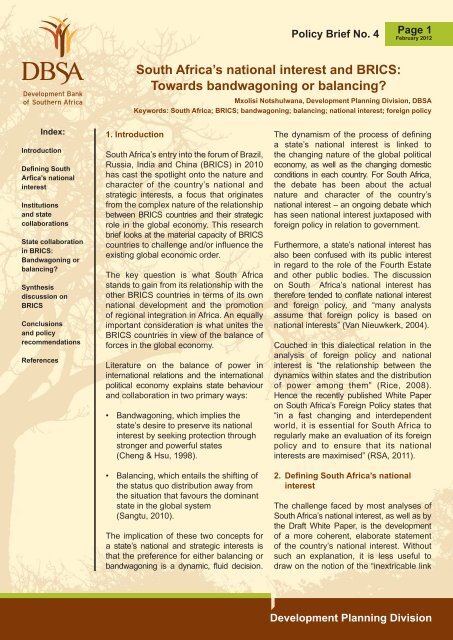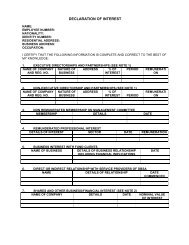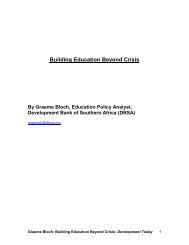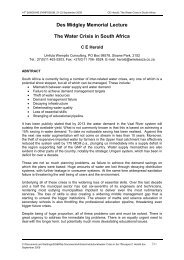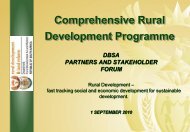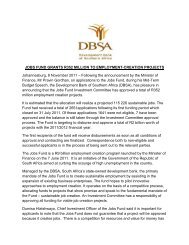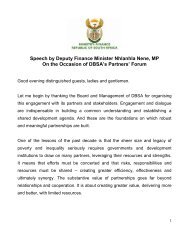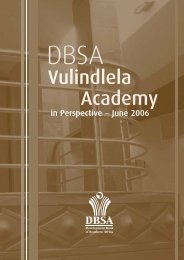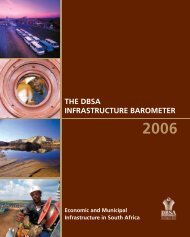South Africa's national interest and BRICS
South Africa's national interest and BRICS
South Africa's national interest and BRICS
You also want an ePaper? Increase the reach of your titles
YUMPU automatically turns print PDFs into web optimized ePapers that Google loves.
Policy Brief No. 4 Page 1February 2012<strong>South</strong> Africa’s <strong>national</strong> <strong>interest</strong> <strong>and</strong> <strong>BRICS</strong>:Towards b<strong>and</strong>wagoning or balancing?Mxolisi Notshulwana, Development Planning Division, DBSAKeywords: <strong>South</strong> Africa; <strong>BRICS</strong>; b<strong>and</strong>wagoning; balancing; <strong>national</strong> <strong>interest</strong>; foreign policyIndex:IntroductionDefining <strong>South</strong>Arfica’s <strong>national</strong><strong>interest</strong>Institutions<strong>and</strong> statecollaborationsState collaborationin <strong>BRICS</strong>:B<strong>and</strong>wagoning orbalancing?Synthesisdiscussion on<strong>BRICS</strong>Conclusions<strong>and</strong> policyrecommendationsReferences1. Introduction<strong>South</strong> Africa’s entry into the forum of Brazil,Russia, India <strong>and</strong> China (<strong>BRICS</strong>) in 2010has cast the spotlight onto the nature <strong>and</strong>character of the country’s <strong>national</strong> <strong>and</strong>strategic <strong>interest</strong>s, a focus that originatesfrom the complex nature of the relationshipbetween <strong>BRICS</strong> countries <strong>and</strong> their strategicrole in the global economy. This researchbrief looks at the material capacity of <strong>BRICS</strong>countries to challenge <strong>and</strong>/or infl uence theexisting global economic order.The key question is what <strong>South</strong> Africast<strong>and</strong>s to gain from its relationship with theother <strong>BRICS</strong> countries in terms of its own<strong>national</strong> development <strong>and</strong> the promotionof regional integration in Africa. An equallyimportant consideration is what unites the<strong>BRICS</strong> countries in view of the balance offorces in the global economy.Literature on the balance of power ininter<strong>national</strong> relations <strong>and</strong> the inter<strong>national</strong>political economy explains state behaviour<strong>and</strong> collaboration in two primary ways:• B<strong>and</strong>wagoning, which implies thestate’s desire to preserve its <strong>national</strong><strong>interest</strong> by seeking protection throughstronger <strong>and</strong> powerful states(Cheng & Hsu, 1998).• Balancing, which entails the shifting ofthe status quo distribution away fromthe situation that favours the dominantstate in the global system(Sangtu, 2010).The implication of these two concepts fora state’s <strong>national</strong> <strong>and</strong> strategic <strong>interest</strong>s isthat the preference for either balancing orb<strong>and</strong>wagoning is a dynamic, fluid decision.The dynamism of the process of defi ninga state’s <strong>national</strong> <strong>interest</strong> is linked tothe changing nature of the global politicaleconomy, as well as the changing domesticconditions in each country. For <strong>South</strong> Africa,the debate has been about the actualnature <strong>and</strong> character of the country’s<strong>national</strong> <strong>interest</strong> – an ongoing debate whichhas seen <strong>national</strong> <strong>interest</strong> juxtaposed withforeign policy in relation to government.Furthermore, a state’s <strong>national</strong> <strong>interest</strong> hasalso been confused with its public <strong>interest</strong>in regard to the role of the Fourth Estate<strong>and</strong> other public bodies. The discussionon <strong>South</strong> Africa’s <strong>national</strong> <strong>interest</strong> hastherefore tended to conflate <strong>national</strong> <strong>interest</strong><strong>and</strong> foreign policy, <strong>and</strong> “many analystsassume that foreign policy is based on<strong>national</strong> <strong>interest</strong>s” (Van Nieuwkerk, 2004).Couched in this dialectical relation in theanalysis of foreign policy <strong>and</strong> <strong>national</strong><strong>interest</strong> is “the relationship between thedynamics within states <strong>and</strong> the distributionof power among them” (Rice, 2008).Hence the recently published White Paperon <strong>South</strong> Africa’s Foreign Policy states that“in a fast changing <strong>and</strong> interdependentworld, it is essential for <strong>South</strong> Africa toregularly make an evaluation of its foreignpolicy <strong>and</strong> to ensure that its <strong>national</strong><strong>interest</strong>s are maximised” (RSA, 2011).2. Defining <strong>South</strong> Africa’s <strong>national</strong><strong>interest</strong>The challenge faced by most analyses of<strong>South</strong> Africa’s <strong>national</strong> <strong>interest</strong>, as well as bythe Draft White Paper, is the developmentof a more coherent, elaborate statementof the country’s <strong>national</strong> <strong>interest</strong>. Withoutsuch an explanation, it is less useful todraw on the notion of the “inextricable linkDevelopment Planning Division
Page 2February 2012Policy Brief No. 4of <strong>South</strong> Africa’s <strong>national</strong> <strong>interest</strong>” (RSA, 2011) withthe region of southern Africa <strong>and</strong> the continent.The Ten-Year Review of the <strong>South</strong> African governmentstates that “adeptness at identifying the <strong>national</strong><strong>interest</strong> <strong>and</strong> pursuing it in a creative way is part ofthe challenge of governance <strong>and</strong> state leadershipin the current global arena” (RSA, 2003). The majorchallenge, however, is how to develop a discourse on<strong>South</strong> Africa’s <strong>national</strong> <strong>interest</strong> that views issues suchas foreign policy, economic diplomacy, public <strong>interest</strong>,<strong>national</strong> security <strong>and</strong> others as subsets of the whole,namely the country’s overarching <strong>national</strong> <strong>interest</strong>.This overarching statement of <strong>South</strong> Africa’s <strong>national</strong><strong>interest</strong> should include the country’s mission<strong>and</strong> vision that are derived from all sectors ofsociety regarding what <strong>and</strong> how best its vital <strong>interest</strong>scan be served. Zakaria (1998) puts the challenge thisway: “Foreign policy is made not by the nation as awhole but by its government. Consequently, whatgovernment can extract for its purposes refl ects theease with which central decision-makers can achievetheir ends.” Foreign policy, therefore, ceases to bethe basis on which <strong>national</strong> <strong>interest</strong> is theorised, <strong>and</strong>rather becomes one of the subsets of the overall<strong>national</strong> <strong>interest</strong>.In the same way that public <strong>interest</strong> <strong>and</strong> <strong>national</strong><strong>interest</strong> are differentiated elsewhere (Netshitenzhe,2002), an all-embracing statement of a country’s<strong>national</strong> <strong>interest</strong> cannot be derived from just one ofits subsets. While this research brief acknowledgesthat all the elements or subsets of a comprehensivestatement of <strong>South</strong> Africa’s <strong>national</strong> <strong>interest</strong> areevident, the conceptualisation of <strong>national</strong> <strong>interest</strong> inpublic discourse <strong>and</strong> government documents is bothmethodologically fl awed <strong>and</strong> conceptually narrow inits explanation.For instance, the government’s foreign policy providesan essential yet limited scope for the statement of thecountry’s <strong>national</strong> <strong>interest</strong>. The government’s policieson trade, security, energy <strong>and</strong> immigration, as well asbusiness engagements, civil society engagements<strong>and</strong> other institutional <strong>and</strong> societal networks, areimportant subsets of the overall statement of <strong>national</strong><strong>interest</strong>. Inversely, the sub-narrative here is whetherforeign policy, public <strong>interest</strong> <strong>and</strong> <strong>national</strong> securityso constructed can actually work against a country’s<strong>national</strong> <strong>interest</strong>.In an extremely useful discussion, Netshitenzhe(2002) states that “<strong>national</strong> <strong>interest</strong> as a concept ismeant to define the aggregate of things that guaranteethe survival <strong>and</strong> flourishing of nation-state <strong>and</strong> nation.Usually the <strong>national</strong> <strong>interest</strong> is counter-posed to thatof other states”. While he is of the view that <strong>national</strong><strong>interest</strong> “is not decreed … it’s a sixth sense <strong>and</strong> itevolves with a nation’s history”, his defi nition providesa good framework for constructing an overarchingstatement of <strong>South</strong> Africa’s strategic <strong>interest</strong>. Indeed,the relationship between <strong>national</strong> <strong>interest</strong> <strong>and</strong> public<strong>interest</strong> needs to be nurtured through civic dialogue<strong>and</strong> discourse that rests on the premise that public<strong>interest</strong> “is meant to represent the <strong>interest</strong>s of theaggregate collective of citizens – independent of stateinstitutions. It’s a kind of collective civil <strong>interest</strong>”.However, Van Nieuwkerk (2004) is critical of thederivative view of <strong>national</strong> <strong>interest</strong> <strong>and</strong> cites theexample of Botswana:Central to our country’s foreign policy are the <strong>interest</strong>sof Botswana which embrace the preservation ofthe democratic form of government, its institutions<strong>and</strong> values, its sovereignty <strong>and</strong> territorial integrity,brooking no interference in its <strong>national</strong> affairs, itsrespect for self-determination <strong>and</strong> independenceof peoples, its non-racialism, its non-alignment, thenon-use of its territory as launching pad for attacksagainst neighbouring states, the non-use of force inthe settlement of disputes <strong>and</strong> the development <strong>and</strong>security of its foreign markets.Van Nieuwkerk also posits that an “inverse relationship”exists, with global political economic factors shaping<strong>and</strong> infl uencing local <strong>and</strong> domestic state action.The global infl uence is taken as a given <strong>and</strong> there isno systematic explanation of its causality. However,he does concede invoking a constructivist notionthat “the world is not simply given <strong>and</strong>/or natural butone of artifi ce – it is constructed through the actions ofother actors themselves” (Van Nieuwkerk, 2004).Hopf (1998) concurs with the above in his elaboratestatement concerning <strong>national</strong> <strong>interest</strong> being derivedfrom all the subsystems of a nation:Although any underst<strong>and</strong>ing of world politics requiresa theorisation of the domestic <strong>and</strong> the analysis of thesystemic, there would be no systemic theory of worldpolitics because the world system has no predominant
Policy Brief No. 4 Page 3February 2012system; it has subcultures, each of which can beunderstood only by examining how states constitutethemselves in their societies. The answer to thequestion of who are enemies <strong>and</strong> friends begins athome. Finding out precisely how a state’s identityaffects the construction of its <strong>interest</strong>s vis-à-visanother state dem<strong>and</strong>s that the social context in whichthe state’s collection of identities is being discursivelyconstructed be investigated as deeply <strong>and</strong> broadlyas possible. This means exploring not only how thestate’s identities are produced in interactions withother states, but also how its identities are beingproduced in interactions with its own society <strong>and</strong> themany identities <strong>and</strong> discourses that constitute thatsociety.It is the latter point with which this policy brief isconcerned. <strong>South</strong> Africa’s <strong>national</strong> <strong>interest</strong> is bestconceptualised <strong>and</strong> derived from how its identitiesare being produced in interactions with its own society<strong>and</strong> the many identities that constitute that society.With regard to the proper conceptualisation of <strong>South</strong>Africa’s <strong>national</strong> <strong>interest</strong>, Van Nieuwkerk (2004) iscorrect in proposing the following questions: “What is<strong>South</strong> Africa’s <strong>national</strong> <strong>interest</strong>? Who determines it?Can <strong>South</strong> Africa afford competing interpretations ofthe <strong>national</strong> <strong>interest</strong>? Or is contestation inevitable;in fact a normal feature of democratic intellectualdialogue? Most of all, can the concept realisticallyguide <strong>South</strong> Africa’s foreign policy?”The debate on <strong>South</strong> Africa’s <strong>national</strong> <strong>interest</strong> <strong>and</strong>foreign policy has been ongoing. This policy briefcontends that the way in which the debate hasdeveloped has tended to place foreign policy above<strong>national</strong> <strong>interest</strong>, <strong>and</strong> not vice versa. The dilemma isthat the media has foisted the false, if essentialist,notion of foreign policy in relation to <strong>national</strong> <strong>interest</strong>on the debate. For instance, an article in The Starmade the following assertion: “How seriously do theZuma people take foreign policy? This is the questionstill preoccupying the diplomats in Pretoria as well aspolicy experts … as the whole of this administrationare too focused on the vicious quarrels within thetripartite alliance” (Fabricius, 2010). The <strong>national</strong>debate in the tripartite alliance is important if it ismeant to assist in defi ning <strong>national</strong> <strong>interest</strong>, in thesame way that a debate in Afri-Forum on the Afrikaanslanguage is important it terms of how it serves thecountry’s <strong>national</strong> <strong>interest</strong>.<strong>South</strong> Africa therefore needs to conceptualise <strong>and</strong>defi ne its <strong>national</strong> <strong>interest</strong> better. A country’s <strong>national</strong><strong>interest</strong> is the collective – <strong>and</strong>, indeed, an aggregation –of all the other <strong>interest</strong>s in all the political, economic<strong>and</strong> social dimensions of state activity. To defi nethe <strong>national</strong> <strong>interest</strong> of a state based on one of itssubsystems is not only incorrect, but also narrowsthe scope of state-society interaction that is requiredto construct an overarching statement of <strong>national</strong><strong>interest</strong>. A great deal of work has been undertakenin each of the subsystems of <strong>national</strong> <strong>interest</strong> in <strong>South</strong>Africa, but what seems to be lacking is a systematic,coordinative discourse towards establishing anoverarching framework.3. Institutions <strong>and</strong> state collaborationThe debate on state collaboration <strong>and</strong> inter<strong>national</strong>cooperation in the global economy has clearlyhighlighted the complex problem that role players face.There is concern about whether global problems canbe addressed without the involvement of institutions,or through loose triangular forums such as <strong>BRICS</strong>.The complexity of the tension in inter<strong>national</strong>cooperation is compounded by the need for playersto coordinate their choices through bindinginstitutional arrangements if they are to achievetheir collective goals.For instance, a formal institutional framework couldhelp create a more useful platform where countriescan also compete with each other to assume positionsof infl uence in inter<strong>national</strong> policy forums. Indeed,both India <strong>and</strong> Brazil have called for the expansionof the United Nations Security Council (UNSC), <strong>and</strong>their inclusion in it, although China has objected tothis (Nye, 2011). These differences need to bemediated through an institutional arrangement within<strong>BRICS</strong> in order to prevent them from leading tomistrust <strong>and</strong> suspicion.Clearly, the assumption that inter<strong>national</strong> playerscan share the same <strong>interest</strong>s <strong>and</strong> agendas on aglobal scale outside of an institutional frameworkis tenuous. <strong>BRICS</strong> collaboration is being defi ned<strong>and</strong> crafted – although in state-centric <strong>and</strong> bilateralways – outside of institutionally binding obligations,norms <strong>and</strong> goals. In the absence of an institutionalstrategic framework, <strong>BRICS</strong> relations with Africa canonly be conceived through collaboration at the levelDevelopment Planning Division
Page 4February 2012Policy Brief No. 4of individual state action (bilateralism), as has beenthe case thus far. It is this aspect of <strong>BRICS</strong>’ role inAfrica’s development that provides both challenges<strong>and</strong> opportunities for <strong>South</strong> Africa’s crucial position inrelation to:• how the country will balance its <strong>national</strong> <strong>interest</strong>as a member of <strong>BRICS</strong>, <strong>and</strong> as a key regionalplayer with <strong>interest</strong>s in the region <strong>and</strong> in Africa.• the ways in which <strong>South</strong> Africa will be able tomoderate, mediate, facilitate <strong>and</strong> drive regionalpositions in <strong>BRICS</strong>’ engagements in order topromote development <strong>and</strong> continental integration.There will be further discussion on these questionslater. Inter<strong>national</strong> institutions have been explainedas a combination of “sets of principles, norms, rules<strong>and</strong> decision making procedures upon which actors’expectations converge” (Krasner, 1985). The literatureon “realism in inter<strong>national</strong> relations” explains therelationship between states in the anarchicinter<strong>national</strong> system as that of states primarilyconcerned with their <strong>national</strong> security. For neorealists,inter<strong>national</strong> institutions are insignifi cant, in thatpower considerations among states are dominant inthe anarchic system (Waltz, 1979; Mearsheimer,2003). In this view, collaboration among states willonly be sustainable if states place a high premiumon interaction, have symmetric resources, <strong>and</strong> areinterdependent.Some neorealists have developed further analysisacknowledging the role of institutions in the inter<strong>national</strong>system, focusing on, for instance, how institutionscan affect the distribution of costs <strong>and</strong> benefi ts ofstate interaction. Furthermore, neorealistic institutionscan be used as devices to seek <strong>and</strong> maintainasymmetric gains <strong>and</strong>, more broadly, to assist incontrolling other players’ behaviour. Neoliberalinstitutionalists have argued for specifi c incentivesfor states to create institutions, as opposed to simplyengaging in ad hoc bargaining. Collaboration is seento be primarily dem<strong>and</strong> driven – that is, players willcreate institutions because they are useful – butthe mechanisms for creating them have not beenspecifi ed (Keohane, 1989). An important angle in theneoliberal institutionalist argument is that institutionsmay constrain future institutional development(Keohane, 1988).A more recent innovation in examining institutions’role in the inter<strong>national</strong> political economy is therole played by politicians <strong>and</strong> experts. Hass (1987)focuses on the efforts of politicians to use linkagesacross various issues to create new “policy planks”in the inter<strong>national</strong> policy arena. Constructivism hasfocused on the matter of ideas, arguing that reality is,in fact, constructed in the minds of decision makers.Constructivists argue that “power <strong>and</strong> <strong>interest</strong>s do nothave effects apart from the shared knowledge thatconstitutes them as such” (Wendt, 1992).Constructivists see norms <strong>and</strong> values as importantcausal forces. Institutions are not only important inconstraining players, but also essential in altering howthey conceive their basic <strong>interest</strong>s. The establishmentof an effective institutional framework is, therefore,important in getting arrangements <strong>and</strong> alliancesbetween states to work.4. State collaboration in <strong>BRICS</strong>: B<strong>and</strong>wagoningor balancing?The previous section has sought to provide aninstitutional analysis of state collaboration in theglobal economy through the lenses of the typesof institution. It offers insights into <strong>BRICS</strong>’ statecollaboration in terms of how these states willcollaborate or coordinate their actions by placingthe premium on their infl uence in changing <strong>and</strong>transforming the global economy. Internally, <strong>BRICS</strong>’state collaboration faces challenges <strong>and</strong> opportunitiesin respect of “free riding”, an inhibiting factor thatcould lead to some states within <strong>BRICS</strong> viewingcertain actions as creating instability in their economyor the regional economy. The institutional design ofstate collaboration therefore seeks to find coordinationpoints that will help deal with varying costs <strong>and</strong>benefi ts for the participating states, especially in statecollaboration of loose <strong>and</strong> informal arrangementssuch as <strong>BRICS</strong>.The involvement of <strong>BRICS</strong> countries (especially China,India <strong>and</strong> Russia) in Africa is growing in unprecedentedways. The social, political <strong>and</strong> economic uncertaintiesthus created require innovative <strong>and</strong> creative ways tomanage the exp<strong>and</strong>ing economic <strong>and</strong> developmentengagement appropriately. <strong>South</strong> Africa’s role inthis increasing engagement is critical if the political<strong>and</strong> economic arrangements <strong>and</strong> opportunities are
Policy Brief No. 4 Page 5February 2012to accrue signifi cant gains in job creation, economicgrowth <strong>and</strong> greater regional integration in Africa.How this engagement is to be focused in terms ofthe strategic roles that different stakeholders will playin the political economy, <strong>and</strong> the kind of inputs thateach will bring to the process, is critical.A signifi cant challenge is that the industrial base(in particular, manufacturing) of most African countriesis weak <strong>and</strong> its contribution to the gross domesticproduct (GDP) is minimal (Hartzenberg et al., 2011).Most countries in southern Africa, for instance, arecharacterised by the predominance of small industrialunits which produce mostly for the <strong>national</strong> <strong>and</strong>regional markets. These fundamental differencesin resources, technology <strong>and</strong> capital endowmentsbetween Africa <strong>and</strong> other <strong>BRICS</strong> member countries(such as China, India <strong>and</strong> Russia) make themcomplementary economic development partners(Fundira, 2011).<strong>South</strong> Africa’s situation is slightly different to that ofthe rest of the continent due to its exp<strong>and</strong>ed <strong>and</strong>diverse industrial base. However, “its social fabric isfraying” (Viljoen, 2011).The next section lays the groundwork for establishingpossible coordination points among <strong>BRICS</strong> countriesthemselves <strong>and</strong> in their relations with the rest ofthe world.4.1 The realities of rising <strong>BRICS</strong>There is concern worldwide about the scope <strong>and</strong>scale of global challenges, combined with the allegeddecline in the United States’ strategic infl uence in theglobal policy arena. This has spawned vast amountsof literature on the viability of the unipolar system.The emerging new global arena is also bringing aboutchange in the foundations of the global inter<strong>national</strong>economy.This situation was recently underscored by analtercation between American President BarackObama <strong>and</strong> some Chinese offi cials at the Asia-Pacifi cEconomic Cooperation (APEC) summit. Commentingon the United States’ frustration with China’s stanceon inter<strong>national</strong> trade relations, President Obamasaid: “We’re going to continue to be fi rm that Chinaoperates by the same rules as everyone.” It is reportedthat Pang Sen, a Deputy Director-General at China’sForeign Ministry replied: “First we have to knowwhose rules we are talking about. If the rules aremade collectively through an agreement <strong>and</strong> Chinais part of it, then China will abide by them. If [the]rules are decided by one or even several countries,China does not have the obligation to abide by that”(Mail & Guardian, 2011).While state-driven processes of connecting the worldare still prevalent, most connections in the world arefacilitated through non-state activities <strong>and</strong> networks.Furthermore, the changing global situation hasbrought into sharp relief the traditional notionsabout the infl uence of formal <strong>and</strong> informalinstitutional arrangements in the global policy arena.The ascendance of emerging markets <strong>and</strong> theirrole in the policy space has increased over the pastfew years. This has seen a proliferation of bothformal <strong>and</strong> informal institutions, including theformation of the World Trade Organisation (WTO),the G20, the G77, the India-Brazil-<strong>South</strong> Africa (IBSA)Dialogue Forum, <strong>and</strong> <strong>BRICS</strong>.The relationship among the <strong>BRICS</strong> countries isconsidered below in order to establish the connectionsin these countries’ strategic engagements in theworld, <strong>and</strong> how they connect with each other <strong>and</strong>globally. In short, the objective is to assess whatunites the <strong>BRICS</strong> countries, <strong>and</strong> how <strong>South</strong> Africawill position itself in <strong>BRICS</strong>.4.1.1 ChinaChina’s emergence as a signifi cant player in theglobal economy has been linked to trends pointingto 2050 that “China will have the largest GDP in theworld, will be the globe’s largest emitter of carbon,will have the largest st<strong>and</strong>ing military <strong>and</strong> will be theworld’s second largest population” (Ikenberry, 2011).The scale of the development path that China hasundertaken both domestically <strong>and</strong> inter<strong>national</strong>ly haspositioned the country as a major strategic playerin the global economic arena. China’s accession tothe WTO in 2001 reassured its proponents that thecountry was prepared to work within the “American-ledliberal hegemonic order” (Mingjiang & Chan, 2010).This pragmatic posture was first generated by China’sconsolidation of its regional multilateralism in EastAsia. In this way, China “believes that multilateralismis a powerful instrument for coping with unipolarity<strong>and</strong> opposing hegemony” (Mingjiang & Chan, 2010).Development Planning Division
Policy Brief No. 4 Page 7February 2012the past few years following its historical links withdeveloping nations in the Non-Aligned Movement(NAM), the G20, the G77, <strong>BRICS</strong> <strong>and</strong> – moreimportantly – within IBSA.4.1.3 BrazilThe Brazilian foreign policy has been anchored ontwo concepts, namely universalism <strong>and</strong> autonomy.Universalism is linked to the country’s position inthe region, with its diversity <strong>and</strong> cultural attributesserving as a springboard for parachuting its<strong>national</strong> <strong>and</strong> regional <strong>interest</strong>s to the rest of theworld. Autonomy relates to Brazil’s ability to engagethe inter<strong>national</strong> policy terrain in ways that projectits <strong>national</strong> <strong>and</strong> regional <strong>interest</strong>s <strong>and</strong> those of thedeveloping world. Brazil’s role in the G20 has beenexceptional <strong>and</strong> “propelled the country to the WTO’sdecision-making core, together with India” (Vigevani &Ramanzini, 2010).The former Brazilian Foreign Minister, Celso Amorim,has acknowledged Brazil’s soft balancing in theinter<strong>national</strong> terrain as follows: “I would say withoutmodesty that Brazil changed the dynamic of WTOnegotiations. Not Brazil by itself. But Brazil leadsthe G20 <strong>and</strong> is sought – almost courted. I wouldsay – by the United States, the European Union <strong>and</strong>Japan, among other countries” (quoted in Vigevani &Ramanzini, 2010).Brazil’s articulation of its role in the inter<strong>national</strong>policy arena – in <strong>BRICS</strong>, IBSA, the WTO <strong>and</strong> theG20 – is underpinned by its commitment to regionalintegration in <strong>South</strong> America <strong>and</strong> as leader ofMercosur, the Common Market of the <strong>South</strong>.In relation to the balance of power in the inter<strong>national</strong>system, Brazil’s position is described thus: “Althoughthe United States remains the only superpower in theinter<strong>national</strong> system, today one can no longer say thatthe world order can be fi tted into a strictly ‘unipolar’model. The political <strong>and</strong> military resources that theUnited States government <strong>and</strong> society have at theirdisposal, though virtually unmatchable, do not ensuretheir capacity to defi ne outcomes on a global scale”(Vigevani & Ramanzini, 2010).4.1.4 RussiaThe assumed relative decline of the United States inthe inter<strong>national</strong> system has given rise to a significantbody of literature that recasts the positive role ofRussia in the world since the collapse of the SovietUnion almost two decades ago. Hopes are thatRussia’s relationship with China, Brazil, India <strong>and</strong><strong>South</strong> Africa will place it at an advantage in relationto the United States. Furthermore, the impendingentry of Russia into the WTO will place the countryprominently in the arena of inter<strong>national</strong> economicactivity.Russia’s strategic role in <strong>BRICS</strong> is to deal with itscontinuing irritation with the United States’ allegedarrogance <strong>and</strong> disregard for inter<strong>national</strong> law,norms <strong>and</strong> obligations. Rather than seeing itselfas a “responsible stakeholder” in an inter<strong>national</strong>economic system underwritten by the United States,“Russia want[s] the United States to be a responsiblenormal great power in concert with other elite few”(Kuchins & Weitz, 2008).Russia is the only member of <strong>BRICS</strong> that has raisedsome of the critical intra-<strong>BRICS</strong> challenges <strong>and</strong>mistrusts among its fi ve member countries. Russia’sforeign policy posture in <strong>BRICS</strong> is to balance China’srise <strong>and</strong> assertiveness. A secret Russian documentis quoted as follows (Skak, 2011):“...special attention must be directed towardsmonitoring the growing role of China in inter<strong>national</strong>affairs, including having in mind the consequencesof Beijing’s activities for our regional <strong>and</strong> global<strong>interest</strong>. We must proceed from the fundamentalimportance of keeping China on a position of actingjointly with us – taking into account the situationaldynamics – within the G20, <strong>BRICS</strong>, <strong>and</strong> SecurityCouncil of the UN (in which our support is often ofgreater signifi cance for Chinese than their supportis for us nowadays).”4.1.5 <strong>South</strong> Africa<strong>South</strong> Africa’s role <strong>and</strong> position in the inter<strong>national</strong>arena have to a large degree derived their legitimacyfrom the democratic <strong>and</strong> egalitarian values that ledto the collapse of apartheid seventeen years ago.The transition from apartheid to becoming a fullmember of the inter<strong>national</strong> community wrought alitany of challenges. On the one h<strong>and</strong>, there wereexpectations that <strong>South</strong> Africa was to become abeacon of hope; on the other h<strong>and</strong>, strategic lapsesaway from its founding values of human rights <strong>and</strong>democracy have led many to believe that the countryhas lost its moral high ground (Baker & Lyman, 2008).Development Planning Division
Page 8February 2012Policy Brief No. 4However, it is in the inter<strong>national</strong> political economicarena that the country’s value has been more prominent.<strong>South</strong> Africa’s predilection for multilateralism <strong>and</strong>infl uence in the UN, G20, G77 <strong>and</strong> WTO has elevatedit to the status of a middle power. This status was atits highest when the country took the lead in st<strong>and</strong>ingfor the Global <strong>South</strong>’s cause; the African agendaincluding championing the establishment of theAfrican Union (AU) <strong>and</strong> the New Partnership forAfrica’s Development (NEPAD).<strong>South</strong> Africa’s inter<strong>national</strong> position was raisedfurther by its membership of IBSA in 2005, combinedwith its non-permanent status at the UNSC in2007/08. Its ascendance to the <strong>BRICS</strong> forum in2010 has provided the country with greater scopeto be the “dealmaker” for southern Africa. <strong>South</strong>Africa will, therefore, have to balance its <strong>national</strong><strong>interest</strong>, regional <strong>interest</strong> <strong>and</strong> advancement of theAfrican agenda.<strong>South</strong> Africa’s <strong>national</strong> <strong>interest</strong> in relation to itseconomic diplomacy in state collaboration within<strong>BRICS</strong> will present the country with opportunities foritself <strong>and</strong> for the process of regional integration inAfrica. However, these challenges <strong>and</strong> opportunitiescan best be addressed once <strong>South</strong> Africa hasdeveloped a proper statement of <strong>and</strong> frameworkfor its engagement in <strong>BRICS</strong>, as derived from its<strong>national</strong> <strong>interest</strong>. What are the incentives <strong>and</strong>motivations for a range of stakeholders in Africafor greater collaboration with <strong>BRICS</strong>, <strong>and</strong> whichroles should each stakeholder play in the process?Put differently, what <strong>and</strong> where are the politicaleconomy areas of win-win situations in the <strong>BRICS</strong>development engagement with Africa?5. Synthesis discussion on <strong>BRICS</strong>State collaboration is not a new phenomenon ininter<strong>national</strong> political economy. The <strong>BRICS</strong> forum <strong>and</strong>the set of interactions <strong>and</strong> institutional frameworksthat this relationship will create are not unique ininter<strong>national</strong> politics. What is unique about <strong>BRICS</strong>,however, is its rising role as a group of emergingmarkets in the determination of a new, democratic<strong>and</strong> inclusive economic order or trajectory in the world.The rising power of the <strong>BRICS</strong> countries is one thing;how these countries will maximise their aggregatepower to change <strong>and</strong> transform the global economyis another. This will, in the main, be a function of howthe <strong>BRICS</strong> countries both collectively <strong>and</strong> individuallybalance <strong>and</strong> b<strong>and</strong>wagon with each other <strong>and</strong> withthe rest of the world, in particular, the United States.In this situation, while hard power is still important,it is less useful <strong>and</strong> strategic infl uence is moreappropriate.Intra-<strong>BRICS</strong> differences, mistrust <strong>and</strong> challenges willform the basis of each <strong>BRICS</strong> country’s balancing orb<strong>and</strong>wagoning strategy. For China, the challenge isthe United States’ reassertion of its strategic infl uencein the <strong>South</strong>-East Asian subregion. The questiontherefore, is whether Asian States will balance againstChina’s rising infl uence or b<strong>and</strong>wagon with it.So, for instance, “China has moved to assertterritorial claims in the resource-rich but hotlycontested waters near Philippines <strong>and</strong> Vietnam.Many of the region’s smaller countries have askedWashington to re-engage in the region as a counterweight”(Johnson & Calmes, 2011). China’s upgradingof the Shanghai Cooperation Organisation (SCO)has drawn serious attention from Washington. On theother h<strong>and</strong>, Russia is cautiously sceptical of China’srise <strong>and</strong> “afraid of becoming a raw material <strong>and</strong>energy appendage to China” (Danchenko, 2010).In <strong>BRICS</strong>, China is critical to Russia as it assertsitself in Europe by building alliances <strong>and</strong> regionalstructures to block the United States.Brazil is also asserting its influence in the Organisationof American States (OAS). The country’s strategicforeign policy posture is to soft-balance the UnitedStates to bring about <strong>BRICS</strong>’ “long, soft l<strong>and</strong>ingin America’s relative decline, not a short, violentcrash” (Jones, 2011). India has immense weight inMyanmar <strong>and</strong> Iran, <strong>and</strong> wields strong infl uencein the inter<strong>national</strong> policy bodies. India <strong>and</strong> Brazilhave aspirations of becoming permanent membersof the UNSC <strong>and</strong> are sceptical of China <strong>and</strong> Russia’sposition in this regard. The continuation of the IBSAforum alongside <strong>BRICS</strong> will provide India <strong>and</strong> Brazilwith a strategic platform to balance their strength inareas in which they have lesser infl uence within the<strong>BRICS</strong> forum.What will <strong>South</strong> Africa do in this diffi cult <strong>and</strong> intenselycompetitive situation? It may be argued that relativelyweaker states such as <strong>South</strong> Africa are “somewhatmore likely to b<strong>and</strong>wagon than strong states are.
Policy Brief No. 4 Page 9February 2012Because weak states can do little to affect theoutcome of contest <strong>and</strong> may suffer grievously in theprocess, they must choose the side that is likely to win”(Walt, 2010).The challenge for <strong>South</strong> Africa, therefore, is toprioritise the maximisation of its <strong>national</strong> <strong>interest</strong>.<strong>South</strong> Africa has to work on its comparativeadvantage as a “regional power <strong>and</strong> this gatewaystatus can be exploited at the economic <strong>and</strong> politicallevel” (Spies, 2010). In relation to <strong>BRICS</strong>, <strong>South</strong>Africa will exert both internal balancing <strong>and</strong> externalbalancing. The former will involve <strong>South</strong> Africa’sdefi nition of its <strong>national</strong> <strong>interest</strong> in relation to <strong>BRICS</strong><strong>and</strong> the country will use this to place the region<strong>and</strong> the African agenda at the centre of the <strong>BRICS</strong>agenda. The latter will involve <strong>South</strong> Africa’s leveragingof the capabilities <strong>and</strong> economic strength of other<strong>BRICS</strong> countries to exp<strong>and</strong> its strategic infl uence inthe world.The critical matter of <strong>South</strong> Africa’s balancing act hasbeen described in this way: “The role of <strong>South</strong> Africa’straditional trading partners – Western countries – hasbeen lessened signifi cantly … China is <strong>South</strong> Africa’slargest trading partner, <strong>and</strong> <strong>South</strong> Africa is the largestdestination in Africa for China’s direct investment …By joining the BRIC countries, <strong>South</strong> Africa also hopesto become the gateway for the BRIC countries’ entryinto Africa …” (quoted in Bhadrakumar, 2010).Indeed, <strong>South</strong> Africa’s balancing behaviour willdetermine the extent to which it will be able to infl uenceits fellow <strong>BRICS</strong> countries to commit to economicdevelopment in Africa. It will also have to do thiswhilst balancing the consolidation of its traditional <strong>and</strong>historical links with the world.6. Conclusion <strong>and</strong> policy recommendationsThis research brief has sought to analyse theimplications of the <strong>BRICS</strong> countries’ relationship for<strong>South</strong> Africa. An evaluation of the <strong>BRICS</strong> countries’foreign policy posture <strong>and</strong> their position in theinter<strong>national</strong> policy arena was deemed importantin order to establish the relational strength that the<strong>BRICS</strong> forum can muster. The relationship amongthe <strong>BRICS</strong> countries is expected to be complex,with impacts from both within <strong>and</strong> outside the forum.The positions that <strong>BRICS</strong> countries will adopt willdepend not only on their internal relationship withinthe forum, but also on the relationship that thesecountries have with the rest of the world. The dynamic,changing character of interactions among states inthe rest of the world will, in turn, also determine thebalancing <strong>and</strong> b<strong>and</strong>wagoning behaviour of the <strong>BRICS</strong>countries.A number of policy areas that <strong>BRICS</strong> countries willhave to address in order to resolve some of the policy<strong>and</strong> institutional issues are outlined below. Thesepolicy implications are raised mindful that the <strong>BRICS</strong>’institutional <strong>and</strong> relational framework among thesecountries is largely still under construction. Many ofthe policy challenges raised below are open-endedquestions posed in a manner that implicitly providesprobable answers to rather diffi cult areas of collective<strong>and</strong> individual state action.In this situation, <strong>South</strong> Africa should urgently developa framework for its <strong>national</strong> <strong>interest</strong> in <strong>BRICS</strong>.In the medium to long term, <strong>South</strong> Africa will need todevelop a comprehensive <strong>and</strong> coherent statementof its <strong>national</strong> <strong>interest</strong>, which places <strong>national</strong>development, regional integration <strong>and</strong> the Africanagenda at the core.Policy implications include the following:• Conceptual gap: <strong>South</strong> Africa needs to defi ne its<strong>national</strong> <strong>interest</strong> <strong>and</strong> build a discourse of how its<strong>national</strong> <strong>interest</strong>s are balanced against its fi rstprinciples in the Constitution, regional integration,the African agenda, as well as its inter<strong>national</strong>values, norms <strong>and</strong> obligations towards the restof the world.• Preference aggregation: State collaboration, morespecifically intra-<strong>BRICS</strong> collaboration, will revolvearound how each <strong>BRICS</strong> economy maps its policypreferences <strong>and</strong> how <strong>BRICS</strong> as a whole establishesan institutional framework for aggregating thesepolicy decisions into a <strong>BRICS</strong> Plan or Programme.• Coordination equilibrium: Free riding in intra-<strong>BRICS</strong> relations will result in a problem of fi ndinga <strong>BRICS</strong> coordination equilibrium with the restof world with regard to human rights, trade, theUNSC, monetary cooperation <strong>and</strong> resourceextraction, <strong>and</strong> how to balance the preponderantstate – the United States.Development Planning Division
Page 10February 2012Policy Brief No. 4• <strong>BRICS</strong> mediation discourse: The fi ve <strong>BRICS</strong>countries are regional powers in their respectiveregions. The assumption is that they havemediated their regional <strong>interest</strong> <strong>and</strong> strategicpositions, <strong>and</strong> have secured a regional m<strong>and</strong>ate.For instance, <strong>South</strong> Africa may refl ect in itsengagements with <strong>BRICS</strong> <strong>and</strong> the rest of worldthat it is “the gateway to Africa”.• <strong>BRICS</strong> expansion: <strong>BRICS</strong> is a growing forum.The question is: In which ways will the inclusionof Mexico, Turkey, Nigeria, Egypt, Thail<strong>and</strong> orIndonesia change the relationship among the<strong>BRICS</strong> countries? How will the balance of powerconfi guration be resolved at <strong>BRICS</strong> <strong>and</strong> atregional level?• China extension/expansion: China’s extension<strong>and</strong> expansion of its scope <strong>and</strong> scale of interaction<strong>and</strong> activities in the world has policy implications.How will <strong>BRICS</strong> countries fi nd a balancebetween third-party preferences in whichChina will engage (e.g. the EU, ASEAN<strong>and</strong> USA) <strong>and</strong> those that the <strong>BRICS</strong> countrieshave with China? Similarly, what <strong>and</strong> howwill <strong>BRICS</strong> countries (particularly China<strong>and</strong> Russia) deal with IBSA’s infl uence on<strong>and</strong> divergent <strong>interest</strong> in <strong>BRICS</strong>?• <strong>BRICS</strong> knowledge hub: <strong>BRICS</strong> needs tomanage, organise <strong>and</strong> disseminate theinformation <strong>and</strong> knowledge about itsactivities in each country <strong>and</strong> in the restof the world. Will the <strong>BRICS</strong> countries adopta hub-<strong>and</strong>-spokes approach where the specifi ccountry knowledge <strong>and</strong> information (spokes)are transmitted into the central hub, <strong>and</strong>where will the hub be located amongstthe <strong>BRICS</strong>?
Policy Brief No. 4 Page 11February 2012ReferencesBaker, PH & Lyman, PN, 2008. <strong>South</strong> Africa: From beaconof hope to rogue democracy? Working Paper, StanleyFoundation, Muscatine, Iowa. Online: http://www.cfr.org/content/thinktank/<strong>South</strong>_Africa_Paper_Dec_2008.pdfBhadrakumar, MK, 2011. China <strong>BRICS</strong> up Africa. AsiaTimes, 4 January. Online: http://atimes.com/atimes/China/MA04Ad02.htmlBrookings Institution, 2011. The foreign policies ofemerging-market democracies: What role for humanrights <strong>and</strong> democracy? Report of proceedings,Inter<strong>national</strong> Forum for Democratic Studies, 14–5 April.Online: http://www.brookings.edu/~/media/Files/rc/reports/2011/06_human_rights_piccone/06_human_rights_piccone.pdfCheng, TJ & Hsu, SP, 1998. Between power balancing<strong>and</strong> b<strong>and</strong>wagoning: Rethinking the post-Cold WarEast Asia. In Yuan, I (Ed.), 2004. Rethinking newinter<strong>national</strong> order in East Asia: U.S., China <strong>and</strong>Taiwan. Institute of Inter<strong>national</strong> Relations, NationalChengchi University, Taipei.Danchenko, I, 2010. One step forward, two stepsbackward? The realities of a rising China <strong>and</strong>implications for Russia’s energy ambitions. PolicyPaper, Brookings Foreign Policy, Brookings Institution,Washington DC.Fabricius, P, 2010. Is foreign policy being thrust uponZuma? The Star (<strong>South</strong> Africa), 26 February.Fundira, T, 2011. Russia – Africa trade at a glance:Economic <strong>and</strong> trade policy overview. Trade LawCentre for <strong>South</strong>ern Africa (Tralac), Cape Town.Goldman Sachs Group, 2007. <strong>BRICS</strong> <strong>and</strong> beyond.Goldman Sachs Global Economics Group, November.Online: http://www2.goldmansachs.com/our-thinking/brics/brics-<strong>and</strong>-beyond-book-pdfs/brics-full-book.pdfHaas, EB, 1987. Adaptation <strong>and</strong> learning in inter<strong>national</strong>organizations. Manuscript. Institute of Inter<strong>national</strong>Studies, Berkeley.Hartzenberg, T, Kalenga, P & Mathis, J et al. 2011.Cape to Cairo: Making the tripartite free trade areawork. Trade Law Centre for <strong>South</strong>ern Africa (Tralac),Cape Town.Hopf, T, 1998. The promise of constructivism ininter<strong>national</strong> relations theory. Inter<strong>national</strong> Security.23(1):171–200.Ikenberry, GJ, 2011. A world of our making. DemocracyJournal, 20, Spring. Online: http://www.democracyjournal.org/20/a-world-of-our-making.php?page=allJohnson, I & Calmes, J, 2011. As US looks to Asia, it seesChina everywhere. New York Times, 15 November.Jones, B, 2011. Largest minority shareholder in globalorder LLC: The changing balance of infl uence <strong>and</strong>U.S. strategy. Policy Paper, Brookings Foreign Policy,Brookings Institution, Washington DC. Online: http://www.brookings.edu/papers/2011/03_global_order_jones.aspxKeohane, R, 1988. Inter<strong>national</strong> institutions: Twoapproaches. Inter<strong>national</strong> Studies Quarterly,32(4):379–96.Keohane, R, 1989. Inter<strong>national</strong> institutions <strong>and</strong> statepower: Essays in inter<strong>national</strong> relations theory.Westview Press, Boulder.Krasner, SD, 1985. Structural confl ict: The Third Worldagainst global liberalism. University of California Press,Berkeley.Kuchins, A & Weitz, R, 2008. Russia’s place in anunsettled order: Calculations in the Kremlin. WorkingPaper, The Stanley Foundation, Muscatine, Iowa.Mail & Guardian, 2011. Obama to China: Behave like a“grown up” economy, 14 November. Online: http://mg.co.za/article/2011-11-14-obama-to-china-behave-like-agrown-up-economy/Mearsheimer, JJ, 2003. The tragedy of great powerpolitics. WW Norton, New York.Mingjiang, L & Chan, G, 2010. China’s search for amultilateral world: Dilemmas <strong>and</strong> desires. Inter<strong>national</strong>Spectator, 45(4):13–25.Netshitenzhe, J, 2002. Should media serve the <strong>national</strong><strong>interest</strong> or the public <strong>interest</strong>? Presentation at theMedia Freedom Day panel discussion, 19 October.Online: http://www.gcis.gov.za/newsroom/speeches/ceo/2002/021019.htmNye, J, 2011. The future of power. Public Affairs Books,Jackson, Tennessee.Republic of <strong>South</strong> Africa (RSA), 2003. Towards aten-year review: Synthesis report on implementationof government programmes. Policy Coordination <strong>and</strong>Advisory Services (PCAS), Presidency.Development Planning Division
Page 12February 2012Policy Brief No. 4Republic of <strong>South</strong> Africa (RSA), 2011. Building a betterworld: The diplomacy of ubuntu. White Paper on <strong>South</strong>Africa’s Foreign Policy. Final draft, 13 May.Rice, C, 2008. Rethinking the <strong>national</strong> <strong>interest</strong>: Americanrealism for a new world. Foreign Affairs, July/August.Online: http://www.foreignaffairs.com/articles/64445/condoleezza-rice/rethinking-the-<strong>national</strong>-<strong>interest</strong>Sangtu, K, 2010. Russia’s choice of alliance: Balancing orb<strong>and</strong>wagoning? Slavic Eurasian Studies, 16:149–61.Skak, M, 2011. The BRIC powers as actors in world affairs:Soft balancing or …? University of Aarhus, Denmark.Online: http://saopaulo2011.ipsa.org/sites/default/fi les/papers/paper-528.pdfSpies, YK, 2010. <strong>South</strong> Africa’s multilateral challenges in a“polypolar” world. Inter<strong>national</strong> Spectator. 45(4):73–91.Van Nieuwkerk, A, 2004. <strong>South</strong> Africa’s <strong>national</strong> <strong>interest</strong>.African Security Review, 13(2):89–101.Viljoen, W, 2011. Review of the NPC Plan: Enhancing<strong>South</strong> Africa’s role in regional <strong>and</strong> global integrationas a driver of economic growth <strong>and</strong> development.Trade Law Centre for <strong>South</strong>ern Africa (Tralac),Cape Town.Walt, SM, 2010. Balancing act (Asian Version). ForeignPolicy, 3 May. Online: http://walt.foreignpolicy.com/posts/2010/05/03/balancing_act_asian_versionWaltz, K, 2001. The theory of inter<strong>national</strong> politics.McGraw-Hill, Boston.Wendt, A, 1992. Anarchy is what states make of it:The social construction of power politics. Inter<strong>national</strong>Organization, 46(2):391–425.Zakaria, F, 1998. From wealth to power: The unusualorigins of America’s world role. Princeton UniversityPress, Princeton.Vigevani, T & Ramanzini, H Jr, 2010. The changingnature of multilateralism <strong>and</strong> Brazilian foreign policy.The Inter<strong>national</strong> Spectator, 45(4):63–71.Editor-in-Chief: Mohammed JahedEditors: William Gumede <strong>and</strong> David MonyaeExternal Language Editor: Aïda ThorneFor enquiries contact:Maria MwafulirwaAdministrator: Policy UnitTel: +27 (0)11 313 3162Email: mariamw@dbsa.orgDisclaimer: The information in this policy brief does not necessarilyrepresent the offi cial views or positions of the DBSA. This is <strong>and</strong> shallremain the property of the DBSA <strong>and</strong> use of this article shall not grant theuser any rights, intellectual property, title <strong>and</strong> <strong>interest</strong> therein which rights,intellectual property, title <strong>and</strong> <strong>interest</strong> shall remain with the DBSA.


